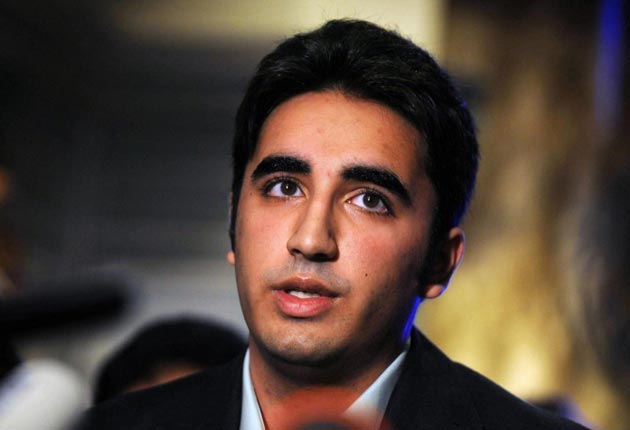The surprising transformation of Bilawal Bhutto into a leader of Pakistan's anti-Taliban movement
His call has gone down very well far beyond the family stronghold


The Afghan Taliban and the Pakistani Taliban are two very different things. The Afghan Taliban, who have stubbornly resisted the worst that the US and Britain could throw at them for the past 12 years, brought a measure of peace and stability to their war-racked country during the late 1990s. Sons of the Pashtun soil, they gained widespread support with their claims to being pious and honest, even though their version of Islam was brutally reductive. That helps to explain why they are still such a force to reckon with today.
The situation is completely different in Pakistan, west of the Indus River, where the shaggy-bearded, bloodthirsty Islamists of the Pakistani Taliban are seen in the same light as ancient Romans regarded the Visigoths – as terrifying barbarian invaders. For all its failings and contradictions, Pakistan enjoys a measure of civilisation unknown in Afghanistan beyond the watering-holes of Kabul. The Pakistani Taliban are a direct threat to all that.
That’s one reason why the decision by Bilawal Bhutto Zardari, the 25-year-old son of Benazir Bhutto and Asif Ali Zardari, Pakistan’s recently retired President, to call for decisive military action against the Pakistani Taliban is going down very well far beyond the Bhutto family’s strongholds in Karachi and rural Sindh.
In an interview with the BBC’s Lyse Doucet this week, Bhutto said: “Dialogue is always an option but we have to have a position of strength. How do you talk from a position of strength? You have to beat them on the battlefield. They are fighting us. It’s not only confined to North Waziristan. They are attacking us in Karachi. We would like to eradicate the Taliban from Pakistan.”
This fiery declaration comes after a long series of unprovoked, murderous attacks by Pakistani Taliban against Christians, Shias, Sufis, Hazaras – the typically diverse enemies of the totalitarian Islam they want to impose. They have also killed schoolchildren and paramedics struggling to inoculate the poorest people in the country against polio, as well as many soldiers.
For all its corruption, the Pakistani state enjoys a degree of democratic legitimacy that is the envy of countries like Libya and Iraq, let alone Syria or Somalia. The Pakistani Taliban would love to put a bomb under all that; yet the chief beneficiaries of the ballot box, Imran Khan and Prime Minister Nawaz Sharif, balk at confronting the fundamentalist menace. On Wednesday Sharif backtracked from a planned army offensive, explaining: “Since the other side has shown intent to negotiate, we also wish to give peace another chance.”
Bilawal Bhutto promptly tweeted, “I want [Sharif] to be our Churchill. Unfortunately he is becoming our Neville Chamberlain…” Bull’s eye! Sharif, a notorious trimmer, must have blushed to the roots of his thinning hair.
Bilawal’s Hal-to-Henry V transformation is all the more surprising given his earlier reputation as an effete, Westernised young man who struggled with his Urdu and, during the last elections, campaigned from Dubai to improve his survival chances. For younger, urbanised Pakistanis, as for their Indian counterparts, political dynasties are so last century: a Gujarati taxi driver told an Indian friend of mine that Rahul Gandhi is “a puppy still suckling his mother’s milk, who hasn’t yet learned even to bark!”
But the flipside of dynastic privilege, on both sides of the border, is assassination, generation after generation. In Bilawal Bhutto at least it seems to have produced some steel.
Join our commenting forum
Join thought-provoking conversations, follow other Independent readers and see their replies
Comments